I arrived back in Abu Dhabi on 23rd April & spent the next couple of days just relaxing at home.
On Friday I met up with Colin at The Club & we enjoyed a good catch up. Spent a lot of time trying to catch up on my blog! Three months trips to write!
Colin & myself
On Friday I met up with Colin at The Club & we enjoyed a good catch up. Spent a lot of time trying to catch up on my blog! Three months trips to write!
Khalifa & me.
Looking for the magpie in the Al Jimi oasis.
Escaped Sacred Ibis
Introduced Arabian Partridge
Red wattled Lapwing
Red vented Bulbul
Lots of fish! But how did they get here?
The quarry! Please note this is not the bird!
This is what we were looking for!
If accepted, would be a 1st for the UAE,
but also probability of escape.
Looking for the magpie in the Al Jimi oasis.
Escaped Sacred Ibis
Introduced Arabian Partridge
Red wattled Lapwing
Red vented Bulbul
Lots of fish! But how did they get here?
The quarry! Please note this is not the bird!
This is what we were looking for!
If accepted, would be a 1st for the UAE,
but also probability of escape.
On the 28th I drove to Al Ain for a day's birding with Khalifa. It was a classic tale of how a planned good days birding could be ruined by the finding of a major rarity! Khalifa saw a Red billed Blue Magpie sat in a tree in the town & eventually flying off over the city while dropping his children off at school! We had arranged to meet in Green Mubazzarah, but after his phone call I re-routed to Al Jimi, where he was waiting for me. We spent the next couple of hours searching unsuccessfully for the magpie.
Nothing doing, so we went to bird Jebel Hafeet, but it was a bit late by this time. We din't see much of note, but had a nice day.
Later Huw joined us for a couple of hours at Zakar (now drying up & far different from its former glory days). We then went back & looked for the magpie again but without any success.
It is 1st May & Paul, Oscar & myself drove up to Ajban Farms to see if the Egyptian Nightjars were breeding again this year. It was a lovely afternoon & we checked a piece of water which held a Grebe sp. which promptly disappeared! We then went to the roosting area for the Nightjars and saw at least four birds. Moving on to the nearby breeding area, at least eight males were calling & in total we saw around 16 individuals! 3 Hoopoe Larks were also present.
On 3rd May Oscar, Gilly, Paul & myself went out with Maarten to visit some of the inner islands around Abu Dhabi. It was a really great trip with plenty of nesting terns, a scattering of migrants & two species of dolphins.
Best birds:
35 Socotra Cormorant; 2 Osprey; 50+ Saunder's Little Tern; 250 Bridled Tern; 500 Lesser crested Tern; 350 White cheeked Tern; 30 Pacific Golden Plover; 1 Lesser Sand Plover, 6 Ruddy Turnstone; 2 Pied Wheatear; 1 Grey headed Wagtail; & 1 Spotted Flycatcher.
Half way up the mountain looking down
on to the plains below.
To the left is underdeveloped Oman,
to the right the developed UAE.
What a contrast!
Immature Egyptian Vulture
Possibly the worst spelling ever?
It is supposed to say Cutlery!
In a cafe on Jebel Hafeet.
Pale Crag Martin nesting in the
veranda of the cafe.
Immature Egyptian Vulture
Possibly the worst spelling ever?
It is supposed to say Cutlery!
In a cafe on Jebel Hafeet.
Pale Crag Martin nesting in the
veranda of the cafe.
Nothing doing, so we went to bird Jebel Hafeet, but it was a bit late by this time. We din't see much of note, but had a nice day.
Zakar Lake, or what is left of it!
Later Huw joined us for a couple of hours at Zakar (now drying up & far different from its former glory days). We then went back & looked for the magpie again but without any success.
This is a rather disturbed piece of desert,
but still holds some interesting species.
It is 1st May & Paul, Oscar & myself drove up to Ajban Farms to see if the Egyptian Nightjars were breeding again this year. It was a lovely afternoon & we checked a piece of water which held a Grebe sp. which promptly disappeared! We then went to the roosting area for the Nightjars and saw at least four birds. Moving on to the nearby breeding area, at least eight males were calling & in total we saw around 16 individuals! 3 Hoopoe Larks were also present.
Red wattled Lapwing
Nesting on a piece of gravel, close to lots of people!
Our transport for the day!
Maarten's wonderful little lifeboat.
View of Abu Dhabi as one leaves the harbour.
Maarten
The motley crew on board!
A species of Banded Sea Snake.
Just offshore are many scattered islands,
some very small.
Immature Socotra Cormorant.
This species has declined over the years
due to persecution by local fishermen.
A highly localized regional endemic.
There are beautiful, sheltered shallow bays.
It really is quite idyllic.
Gilly, Oscar & Paul.
Spotting jellyfish on the beach.
Lesser crested Terns
The odd White cheeked Tern
is in the flock as well.
Over 500 were seen in one bay.
Some displaying, which gives hope for
potential breeding in the area.
These birds are very susceptible to disturbance.
This pair were displaying.
Bridled Tern
This species is the last species to arrive to breed
on these islands.
They like nesting with some sort of cover,
natural vegetation or indeed rubbish will do!
Colonies are scattered over many islands &
they are very loosely packed together.
White cheeked Tern
This species is the most numerous of the
breeding tern species on these islands.
They nest right out in the open,
often on raised bits of ground.
Saunder's Little Tern
Yet another very range restricted
breeding species.
It breeds in loose, scattered colonies.
This species arrives in early April
& gets a head start on all the other tern species.
Part of the flock of 30 Pacific Golden Plovers
(with one Ruddy Turnstone).
Our transport for the day!
Maarten's wonderful little lifeboat.
View of Abu Dhabi as one leaves the harbour.
Maarten
The motley crew on board!
A species of Banded Sea Snake.
Just offshore are many scattered islands,
some very small.
Immature Socotra Cormorant.
This species has declined over the years
due to persecution by local fishermen.
A highly localized regional endemic.
There are beautiful, sheltered shallow bays.
It really is quite idyllic.
Gilly, Oscar & Paul.
Spotting jellyfish on the beach.
Lesser crested Terns
The odd White cheeked Tern
is in the flock as well.
Over 500 were seen in one bay.
Some displaying, which gives hope for
potential breeding in the area.
These birds are very susceptible to disturbance.
This pair were displaying.
Bridled Tern
This species is the last species to arrive to breed
on these islands.
They arrive at the end of April.
This individual is using a discarded car seat
as a vantage point!
They like nesting with some sort of cover,
natural vegetation or indeed rubbish will do!
Colonies are scattered over many islands &
they are very loosely packed together.
White cheeked Tern
This species is the most numerous of the
breeding tern species on these islands.
They nest right out in the open,
often on raised bits of ground.
Saunder's Little Tern
Yet another very range restricted
breeding species.
It breeds in loose, scattered colonies.
This species arrives in early April
& gets a head start on all the other tern species.
By nesting early, they avoid the predation by humans
& Indian House Crows which comes
later in the season.
The first chicks of the season.
Part of the flock of 30 Pacific Golden Plovers
(with one Ruddy Turnstone).
On 3rd May Oscar, Gilly, Paul & myself went out with Maarten to visit some of the inner islands around Abu Dhabi. It was a really great trip with plenty of nesting terns, a scattering of migrants & two species of dolphins.
Best birds:
35 Socotra Cormorant; 2 Osprey; 50+ Saunder's Little Tern; 250 Bridled Tern; 500 Lesser crested Tern; 350 White cheeked Tern; 30 Pacific Golden Plover; 1 Lesser Sand Plover, 6 Ruddy Turnstone; 2 Pied Wheatear; 1 Grey headed Wagtail; & 1 Spotted Flycatcher.
Indo Pacific Hump backed Dolphin
This was part of a pod of nine individuals.
This species is often found close inshore
in shallow seas.
This animal has somehow survived
being tangled in a fishing nest.
This same individual has a huge chunk
missing out of its dorsal fin.
This female is displaying to males, ready for mating.
Mating!
The water was so clear, that you can see them
well under the water.
Bottle nosed Dolphin
There was a pod of eight animals,
but these were far more shy.
This species is often found close inshore
in shallow seas.
This animal has somehow survived
being tangled in a fishing nest.
This same individual has a huge chunk
missing out of its dorsal fin.
This female is displaying to males, ready for mating.
Mating!
The water was so clear, that you can see them
well under the water.
Bottle nosed Dolphin
There was a pod of eight animals,
but these were far more shy.
We all enjoyed a fantastic day out. Thanks Maarten, until the next time.
Common Nightingale
Rufous Bush Chat
Spotted Flycatcher
Barred Warbler
On the 4th May I had a walk back in time around Mushrif Palace Gardens. I have been birding this location for 27 years! The weather was fantastic & although there were not a lot of migrants around I did see some interesting species:
2 Oriental Honey Buzzard; 6 Common Redstart; 2 Rufous Bush Chat; 3 Common Nightingale; 1 Upcher's Warbler; 1 eastern Olivaceous Warbler; 1 Barred Warbler & 1 Willow Warbler.
I was back at the same location on 6th May, as Oscar had found a Pied Flycatcher the previous day. I had no great hopes of seeing it, as spring migrant rarely stay more than one day on the rush to get to their breeding grounds. And so it proved. I spent nearly five hours in the area, seeing a nice selection of birds but no Pied Flycatcher.
Best birds:
3 Spotted Flycatcher; 5 Blackcap; 1 Common Whitethroat; 3 Upcher's Warbler; 2 Eastern Olivaceous Warbler; 2 Barred Warbler; 3 Common Redstart & a Common Nightingale.
On 8th May a few of us had a late afternoon back at Ajban looking for Egyptian Nightjars. The weather was fantastic & we had a nice time.
Best birds:
1 male Little Bittern; 4 Chestnut bellied Sandgrouse & 16 Egyptian Nightjar were the highlights. We also saw an Arabian Gazelle.
Then all too soon my time was up in the UAE, & I flew out to London on 10th May.
Red wattled Lapwing
A pair were breeding in the front wood.
Eurasian Collared Dove
Little Green Bee-eater
Female Blackcap
Graceful Prinia
Indian Silverbill
I was back at the same location on 6th May, as Oscar had found a Pied Flycatcher the previous day. I had no great hopes of seeing it, as spring migrant rarely stay more than one day on the rush to get to their breeding grounds. And so it proved. I spent nearly five hours in the area, seeing a nice selection of birds but no Pied Flycatcher.
Best birds:
3 Spotted Flycatcher; 5 Blackcap; 1 Common Whitethroat; 3 Upcher's Warbler; 2 Eastern Olivaceous Warbler; 2 Barred Warbler; 3 Common Redstart & a Common Nightingale.
A distant male Little Bittern
Egyptian Nightjar
There are at least eight pairs breeding in this area.
Amazingly well camouflaged!
A young Crested Lark.
On 8th May a few of us had a late afternoon back at Ajban looking for Egyptian Nightjars. The weather was fantastic & we had a nice time.
Best birds:
1 male Little Bittern; 4 Chestnut bellied Sandgrouse & 16 Egyptian Nightjar were the highlights. We also saw an Arabian Gazelle.
Then all too soon my time was up in the UAE, & I flew out to London on 10th May.






























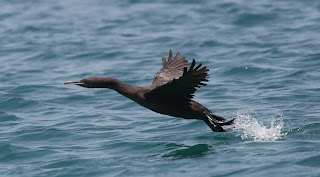














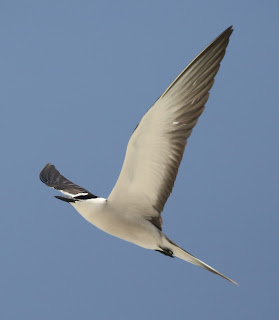




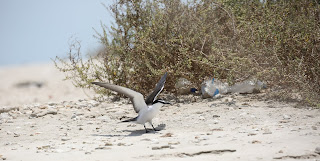





















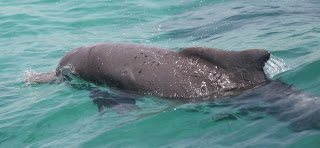















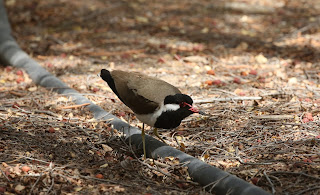

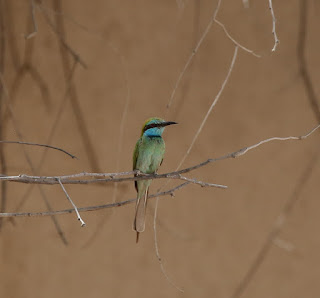










No comments:
Post a Comment